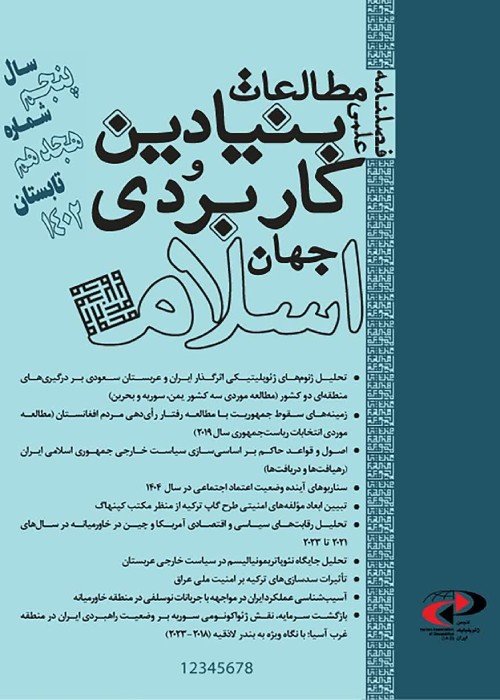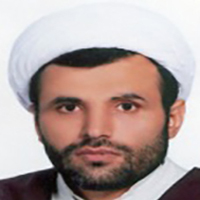Religious Democracy: Muslim World's Legal Solution for Overcoming the Currents of Secularism and Salafi Fundamentalism
The present era in the Muslim world can be called the age of the confrontation of two major currents "secularism" and "Salafism." Due to a lack of a local political system based on religious foundations and in accordance with the conditions, needs and necessities of the present era, Muslim countries, especially the active elite groups, young people and political and social strata have joined two main currents to legitimize their political systems. They voice their demands through the two currents of extreme Salafism which includes diverse political, religious, social and cultural spectrum, and the west-oriented extreme perspective that manifests in the form of secularism and laicism models that has influenced diverse spectra including the youth, the educated, women etc. The present paper mainly deals with explaining religious democracy as a fundamental legal solution for the accomplishment of the religious and worldly objectives of Islamic countries.
Using the a descriptive-analytic method, the present paper aims to answer the question as to what are the capacities of the "religious democracy" model and how does it carries out its mission.
The research hypothesis is that, considering the requirements of the Muslim world and the authentic Islamic approaches, none of these two currents are suitable or ideal solutions, because on the other hand, combining these two political currents while preserving their core elements is not possible, and on the other hand, full unconditional acceptance of each of these currents has led to a permanent confrontation with the opposing current. and ultimately results in war, bloodshed, and the threat to peace and global and regional security.
Based on the principles governing religious democracy, participation of people in social affairs and management of society is a rare value in human societies. According to these principles, God's rule will only be realized if people also accept such a rule. The relationship between government and people in religious democracy pushes the rulers towards a sincere attitude towards the value of people's participation. They do not regard the interference of the people as obstructive, but consider it as recommended in religious teachings. In religious democracy, the presence and participation of people continues after the formation of the government. After voting for the government, they continue to play an active role in the governance of the country and do not have to just obey the orders of the leaders. With close attention to different Quranic, traditional and rational references, we find that the people's demands have a major role not only in the establishment of the government, but also in its survival and continuity. In religious democracy, people's vote, their participation and their presence in different areas are respected and two types of majority votes are valid: one in execution and practice, and the other in the recognition of the divine law presented by religion. Intellectuals believe in the priority of the majority vote, and the divine law does not reject this foundation of intellectuals.
Since its advent, the Muslim world has been facing numerous political currents. The formation of these currents has largely been due to a deviation from the original Islam and attention to the elements of ethnicity, nationality and capriciousness among Muslims, and the penetration of imported and borrowed thoughts in their united ranks. In the present age, the current and common models among Islamic countries, especially in the field of governance and political system are not based on the pure Islamic thoughts. Rather, they are influenced either by the Western world model or the deviant Takfiri thoughts. The dominant political-social currents in the Muslim world, especially after the Arab Spring Movement (Islamic Awakening) is divided into two major currents: extreme fundamentalist current, including Salafi and Takfiri groups with vast religious, political and social spectra and the extreme west-oriented secularism covering vast cultural, political, social spectra, especially the youth and women.Facing these two extreme currents is the authentic Islamic current (religious democracy), which holds that the revivalism in Muslim world and protecting the dignity, honor, and independence, religious Brotherhood and Islamic unity are possible through reforms which are based on the inherent and authentic Islamic foundations. The legal solution is considering both prevailing currents, interpreting and revising their pillars and combining their congruent elements, and ultimately reaching a result that will be different from both currents. Islam does not acknowledge democracy as the main pillar of political thought, but accepts many of its elements, such as freedom, equality, the right of people to determine their destiny, the and rule of law; it implements the strategies of democracy, such as autonomy of forces, constitution, elections, civil institutions, etc. and is different from any of the extreme currents. This process eventually leads to religious democracy, which is based on the political pillars and issues such as freedom and equality based on Islamic justice and national sovereignty within the framework of the Council and the Islamic Parliament, and uses mechanisms of democracy such as elections with the characteristics of Islamic allegiance and parties in the form of. In religious democracy, the rule of law has sanctity because of the divinity of Islamic commandments.
- حق عضویت دریافتی صرف حمایت از نشریات عضو و نگهداری، تکمیل و توسعه مگیران میشود.
- پرداخت حق اشتراک و دانلود مقالات اجازه بازنشر آن در سایر رسانههای چاپی و دیجیتال را به کاربر نمیدهد.



